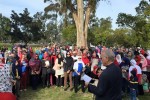At the end of February, a Muslimah “pray-in” led by Fatima Thompson at the Islamic Center of Washington, D.C. created a stir in the media. A small group of women chose to pray in the back of the men’s section of the prayer area, rather than use the separate women’s section. Mosque leaders proceeded to inform the police after unsuccessfully asking the women to move to the small women’s “area off to the side and gated off by a solid seven foot partition.” The women were eventually asked to leave.
Masjid prayer areas for women are frequently criticized as shockingly unequal from men’s. Over at altmuslimah, Sarrah Abulughod eloquently writes about women’s place in the masjid:
When speaking to the multitude of women who complain about the accommodations and treatment they receive in the mosque, one common thread runs through their criticisms. They want a decent, clean, quiet space to reflect on their Lord, a space that does not pose a barrier to education or ideas, just as the male worshipers enjoy. Yes, some prefer a separate space altogether and we’re not discounting those among us who do, but regardless of whether the women’s prayer room is separate or not, the second-class nature of the back door, the dingy basement room, or the cluttered storage hall will not do any longer.
Over at The Daily Beast, Asra Nomani relates the D.C. pray-in this year to her own struggle for receiving a better prayer space:
What unfolded that day inside the mosque underscores a growing agitation inside the American-Muslim community by women frustrated by separate-and-unequal status. A survey by the Council on American Islamic Relations showed that two of three mosques in 2000 required women to pray in a separate area, up from one of two in 1994. In 2003, I challenged rules at my mosque in Morgantown, West Virginia, that women enter through a back door and pray in a secluded balcony….The men at my mosque put me on trial to be banished.
In addition to the blog posts, the event was also picked up by news outlets. In an Associated Press article, the women who participated in the pray-in are portrayed as revolutionaries, having “risked arrest by praying in the main hall.” The article includes an assertion from one of the protesters, Jannah bint Hannah, who proclaims that she feels like a “second-class citizen.” Surprisingly, the brief article does not include any comments from representatives of the actual Islamic Center of Washington, D.C. and instead attributes an explanation for the segregation to an imam from an entirely different institution.
The Washington Post also covered the event, which it portrays as one in a long line of reform efforts led by “Muslim activists” and elaborates on the “discrimination” Muslim women face in masjids:
Thompson’s protest at the stately mosque along Embassy Row is the latest effort by Muslim activists to reform conditions in U.S. mosques that they say are discriminatory and degrading to women. Muslim prayers are typically led by male imams. Behind them are rows of men, and behind them rows of women and children.
The interest in this news event highlights the overwhelming interest in how Muslim women are treated unequally in Islam, while also bringing to the public’s attention what Muslim communities have been unable (or unwilling) to address on their own. How often do we hear how Muslim women are subjugated by their religion at the hands of men?
But the coverage here also shows that Muslim women (and not non-Muslims) are asserting their views in what has traditionally been a male-dominated place. More importantly, Muslim women are voicing their silenced concerns for everyone—not only the Muslim community—to hear as a means to effect change.



